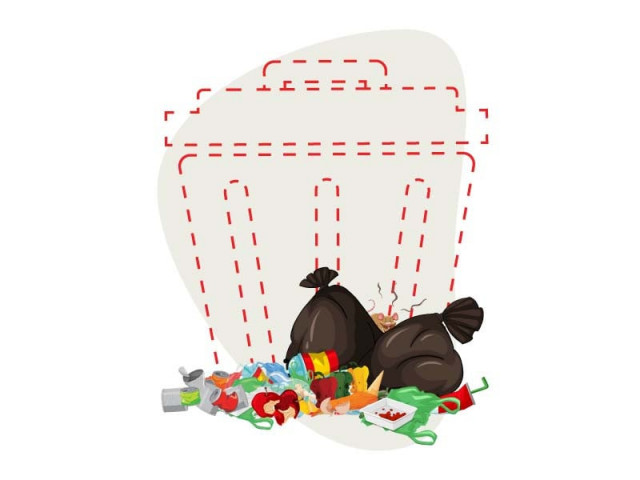Litter accumulates on city’s streets amid garbage can shortage
Small trashcans placed on every street have been removed, few replaced with large dumpsters that are inaccessible

It is no secret that the port city has a deep-rooted littering problem. In view of this, the Sindh Solid Waste Management Board (SSWMB) had installed trashcans across Karachi, hoping that that city of 20 million would use them rather than the streets for its waste disposal needs.
It appears now that these trashcans have gradually disappeared from the city's major highways and busiest avenues, while only a few have been replaced with larger dumpsters. However, the larger dumpsters are few and far between and not immediately accessible to the citizens, owing to which an excess of litter has been landing on Karachi's streets, turning into mounds of trash around every kerb and corner.
The SSWMB was set up in 2016, at the behest of the Sindh government, to take over the domain of solid-waste disposal from the city's local bodies. The provincial body initially assumed the responsibility of maintaining cleanliness within the jurisdiction of the Karachi Metropolitan Corporation, District Municipal Corporation (DMC) East, and District Municipal Corporation South. At present, it is responsible for carrying out all cleaning work on 32 major highways of Karachi, including limits of DMC East, DMC West, DMC South, DMC Korangi, DMC Malir, and DMC Kemari. While DMC Centeral is the only zone in the city that utilises its own resources for sweeper works.
A survey conducted by The Express Tribune reveals that within all zones, it is largely food streets and commercial areas that are currently the most littered places. Especially those in Hussanabad, Burnes Road, Tariq Road, Bahadurbad, Alamgir Road, Pir Elahi Bakhsh Colony, MA Jinnah Road, Bolton Market, Saddar Areas, Lee Market, Ayesha Manzil and Shahra-E-Pakistan. Much of this situation, per citizens and sanitation workers, exists due to the lack of easy access to smaller trashcans on every street.
In addition to that, according to CBA for workers chairperson Syed Zulfiqar Shah, SSWMB has outsourced the entire cleaning work to various Chinese companies. "The board has no resources of its own. It only pays the salaries of officers who oversee the sanitation work. Chinese companies pay the salaries of all lower-level cleaning staff while the machinery, waste bins, and large dumping containers are also owned by foreign firms. In short, all the cleaning work from sweeping to garbage collection and disposal is done by these companies. The Chinese companies had initially placed iron-made dust bins on major highways, roads, and alleys but were later replaced with thousands of plastic bins," he informed.
Opining further, Shah said that the placement of these bins in various places was gradually creating a culture of cleanliness among the citizens, who were slowly but surely growing more conscious of littering on the streets. He maintained that a large number of waste bins also made it easy for the citizens including shopkeepers and hotel owners to dump their rubbish without hassle. "In fact, for a while, the city's main highways and food streets did not have mounds of uncollected garbage as they do now, in presence of the few large dumpsters that are sparsely placed," he added.
SSWMB Executive Director for Operations Tariq Ali Nizamani shedding light on the matter, said that the board has reduced the number of small waste bins after installing large containers in residential areas. However, the number of waste bins has not been reduced in commercial areas. "At the request of the traffic police, small waste bins were removed from some places on the service roads of major highways where they were disrupting the flow of traffic," Nizamani told.
Although, Zulfiqar Ali Shah was keen to highlight that only 25 per cent of the original number of plastic waste bins currently remain in the city, Nizamani denied all claims maintaining that small dustbins are still in place in the city's commercial areas. "As for residential areas, the staff of SSWMB has started collecting garbage from door to door. The cleaning staff dumps the garbage in large containers which the garbage trucks pick up and take to dump at the landfill site," he told The Express Tribune.
Published in The Express Tribune, March 25th, 2022.



















COMMENTS
Comments are moderated and generally will be posted if they are on-topic and not abusive.
For more information, please see our Comments FAQ